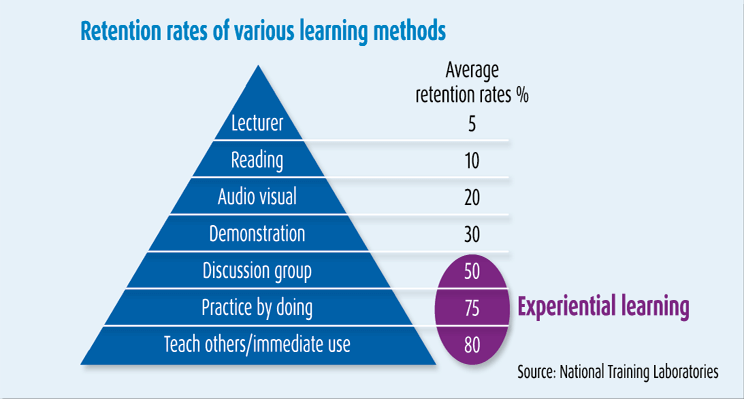What is Experiential Learning?
Experiential learning is a process of learning through experience or hands-on activities. It involves actively engaging with real-world experiences to gain knowledge, develop skills, and enhance understanding. This approach emphasizes practical application and reflection on the experience.
This style of learning often contrasts with traditional classroom-based learning that relies more on theoretical instruction and passive absorption of information. In experiential learning, individuals learn by doing, making mistakes, reflecting on those experiences, and applying insights to future situations.
Different Examples
Throughout my time in college, I noticed that the most successful students tended to have a lot of on-the-job experience. They brought back insights they gained from their job back into school. There are many classes that also reward credits for a successful internship in which you can analyze what you did in your role. This successful synthesis of a job can bring even more benefits to students. You’re also likely to get a return offer if you perform well in your role.
Another successful implementation of experiential learning is through case competitions. I’ve seen many firms participate by hosting their own competitions as well as colleges themselves. The case study usually outlines a specific business situation, challenges, and opportunities, and participants are tasked with developing strategies or recommendations to address the issues presented. It is usually followed by a Q&A as well as networking with attendees. These competitions prepare you for real-world business challenges and require participants to work under time constraints, enhancing their ability to make strategic decisions in dynamic environments.
Here are some more examples of experiential learning:
Lab Work in Science and Engineering: Conducting experiments and hands-on laboratory work in scientific and engineering disciplines enables students to apply scientific principles, test hypotheses, and gain practical skills.
Field Trips and Site Visits: Visiting relevant industries, historical sites, or natural environments can enhance learning by providing firsthand experiences and context.
Service Learning Projects: Combining community service with academic learning allows students to address real community needs while gaining practical skills and a deeper understanding of social issues.
Entrepreneurship Programs: Engaging in the process of creating and running a business, whether through startup incubators or entrepreneurship courses, provides a practical understanding of business concepts.
Language Immersion Programs: Living in a region where the target language is spoken allows individuals to immerse themselves in the language, culture, and daily life, accelerating language acquisition (think study abroad programs).
Scientific Research Projects: Engaging in research projects, whether in a laboratory or in the field, provides an opportunity to contribute to the advancement of knowledge and gain practical research skills.
The Future of Experiential Learning
I believe experiential learning enhances understanding, retention, and the application of knowledge in real-world contexts. It will become even more prevalent in colleges around the world as students continue to seek ways to improve their educational experience.

